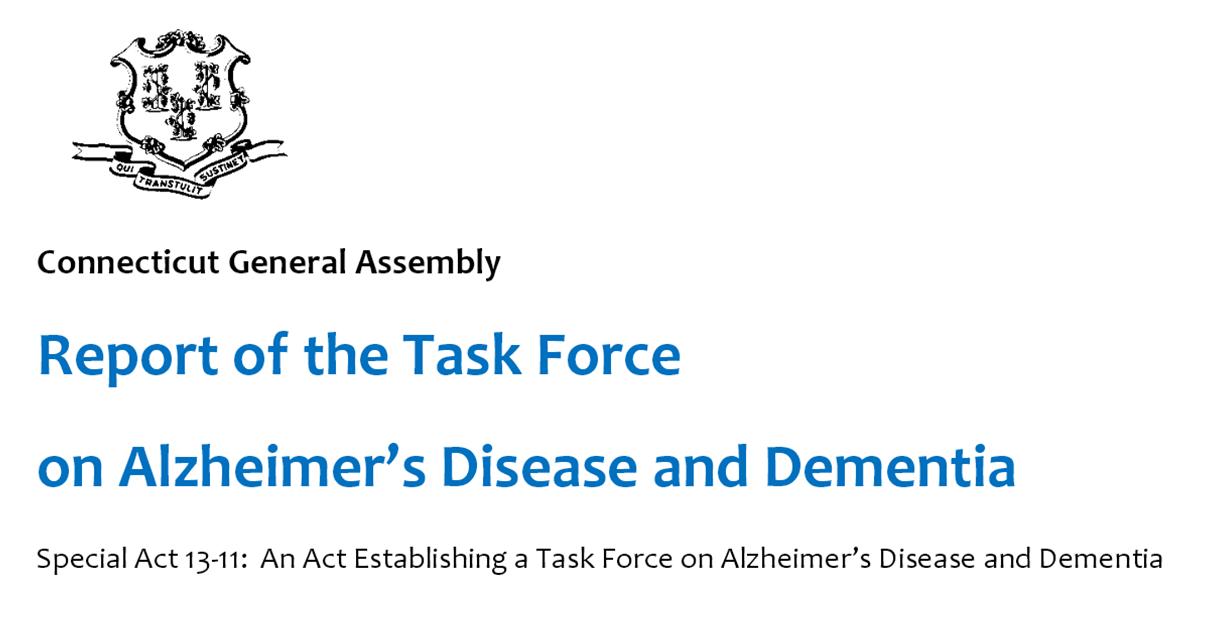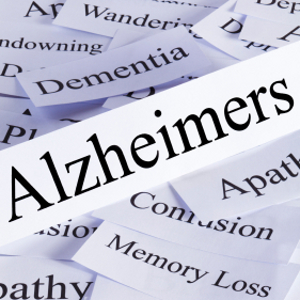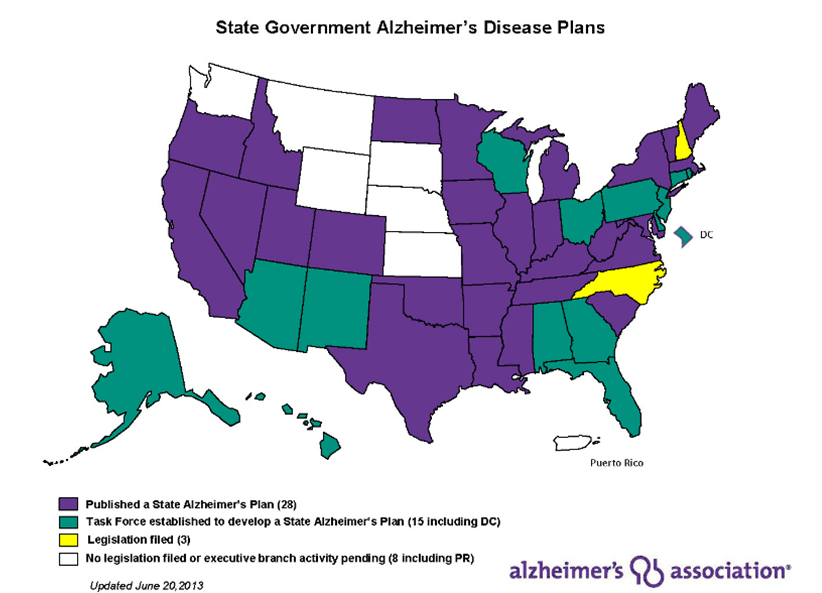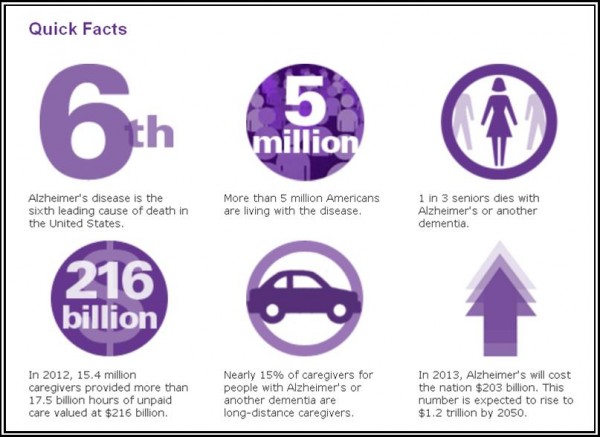Wide-Ranging Actions Needed to Respond to Growing Alzheimer’s, Dementia Population in CT, Task Force Reports
/
In a 50-page report to the Connecticut legislature, the Alzheimer’s Disease and Dementia Task Force has outlined a series of 14 wide-ranging recommendations aimed at responding to the needs of a growing number of individuals and families facing the challenges of Alzheimer’s and dementia in Connecticut.
The recommendations include promoting public awareness and best practices including development of an education program for bank personnel, stepped-up dementia-specific training of health care professionals , court personnel and first responders, and improved support of informal caregivers.
The Task Force is urging “mandatory dementia-specific training for hospital emergency room staff, including nurses, physicians and medical technicians,” which may require legislation in the upcoming General Assembly session. In addition, the Task Force – in another initiative likely to be the subject of legislation- calls for basic level of dementia training for public safety responders, long-term car e ombudsmen, protective service employees probate judges and court personnel.
e ombudsmen, protective service employees probate judges and court personnel.
Recognizing that “there are few Alzheimer’s and dementia training requirements for health care professionals and facilities,” the Task Force outlines a series of “detailed recommendations for dementia-specific training requirements across the continuum of care,” including home and community based services such as home health aides, homemakers and companions and personal care assistants.
The report also called for an analysis of the financial impact of developing a Dementia Centers for Excellence (COE) or geriatric assessment units at Connecticut hospitals.
The 25-member task force was formed by the legislature last year, and was administered by Connecticut’s Legislative Commission on Aging. It was co-chaired by State Rep. Joseph Serra and Department on Aging Commissioner Edith Prague. The Alzheimer’s Association of Connecticut worked with policymakers on introducing legislation that created the Task Force. The Task Force met six times over four months, breaking into three subcommittees, which each met 4-6 times, to develop the final recommendations. The committees focused on 1) Early Detection, Intervention and Planning, 2) Quality Care, Service Delivery and Care Management, and 3) Workforce Training and Development.
According to the Alzheimer’s Association, there are an estimated 70,000 individuals with Alzheimer’s or other dementia. An estimated 60 to 70 percent of older adults with Alzheimer’s disease and other dementias live in the community, compared with 98 percent of older adults without Alzheimer’s disease and other dementias. Of those, 75 percent live with someone and 25 percent live alone. The recommendations also call for:
- Creation of a public/community awareness campaign through partnerships with agencies and organizations including the Alzheimer’s Association, AARP and Area Agencies for Aging, as well as faith-based and immigrant communities, business/corporate associations, the medical community and resources such as 211.
- Dissemination of informational packets to be distributed at doctor’s offices, pharmacies, senior centers and other locations

- Promotion of Medicare Annual Wellness visits which include a cognitive impairment assessment
- Development of a “bank reporting project” which will train bank employees about “potential red flags” that indicate suspicious activity. The reported noted that “cognitive impairment poses the most significant risk for exploitation, and bank personnel may be in a unique position to detect financial exploitation of older adult and individuals with dementia.”
To provide greater support for informal caregivers of individuals with dementia, the Task Force is urging development  of a “train the trainer” dementia course based on the existing Alzheimer’s Association leaders’ training, and drawing on the model of the American Red Cross’ CPR training program to offer “accessible and affordable dementia education to caregivers.”
of a “train the trainer” dementia course based on the existing Alzheimer’s Association leaders’ training, and drawing on the model of the American Red Cross’ CPR training program to offer “accessible and affordable dementia education to caregivers.”
The Task Force is urging an increase in state funding to expand the Connecticut Statewide Respite Care Program, and to expand and set aside slots for individuals with younger onset Alzheimer’s disease in the Connecticut Home Care Program for the Disabled.
The report also would have the Department of Motor Vehicles “explore policies and regulations related to revoking drivers licenses” and calls on the agency to “take a proactive approach in educating physicians about reporting unsafe drivers to the DMV.” The Task Force also calls for establishment of a care manager registry at the Department of Consumer Protection, a new licensure model at the Department of Public  Health for homemaker and companion agencies and collaborative initiatives with the Department of Social Services.
Health for homemaker and companion agencies and collaborative initiatives with the Department of Social Services.
Julia Evans Starr, Executive Director of Connecticut’s Legislative Commission on Aging, said “It is well-documented that Alzheimer’s and related dementias exact a devastating toll not only on sufferers of the disease, but on the emotional and physical health of their caregivers. Sound public policies that help alleviate emotional and physical stress on affected individuals and their families are imperative, as well as giving these folks choices on receiving care in their communities rather than institutions.”
Dementia is an umbrella term describing a variety of diseases and conditions that develop when nerve cells in the brain die or no longer function normally. Different types of dementia area associated with distinct symptom patters and brain abnormalities. Alzheimer’s is the most common type of dementia, which causes problems with memory, thinking and behavior. Over 5 million Americans of all ages have Alzheimer’s, including one in nine people age 65 and older (11 percent). That number is expected to increase as the elderly population increases in the coming years.



 vers.
vers.





























